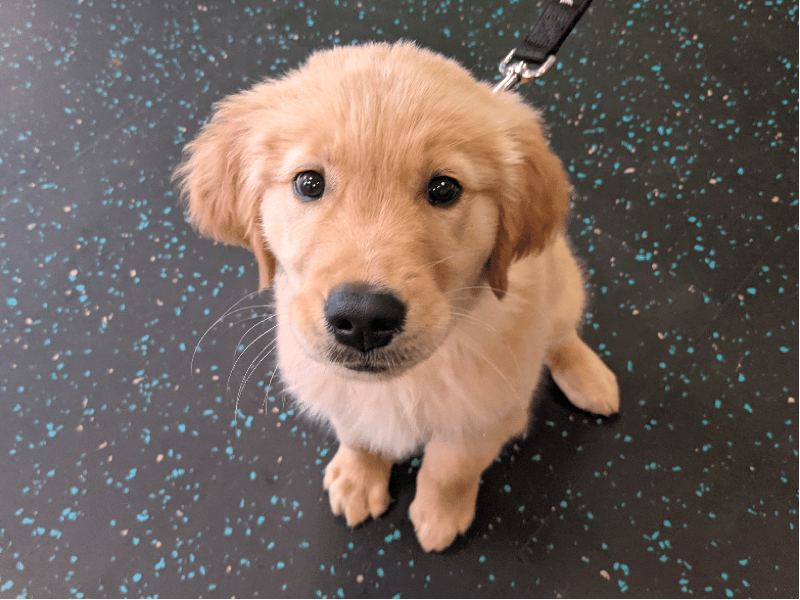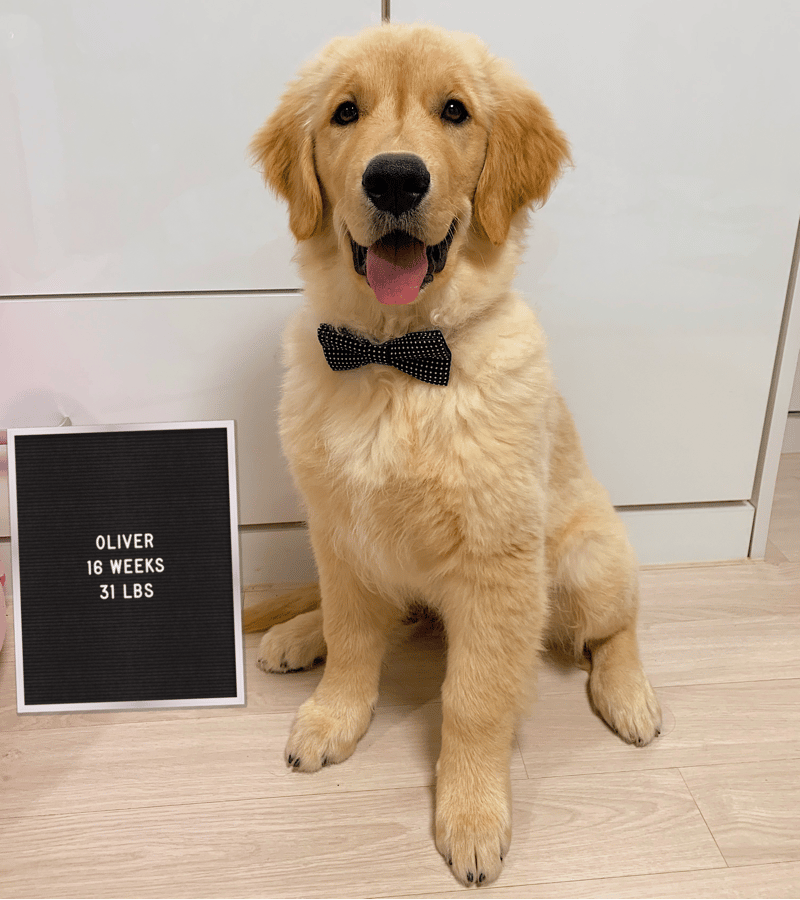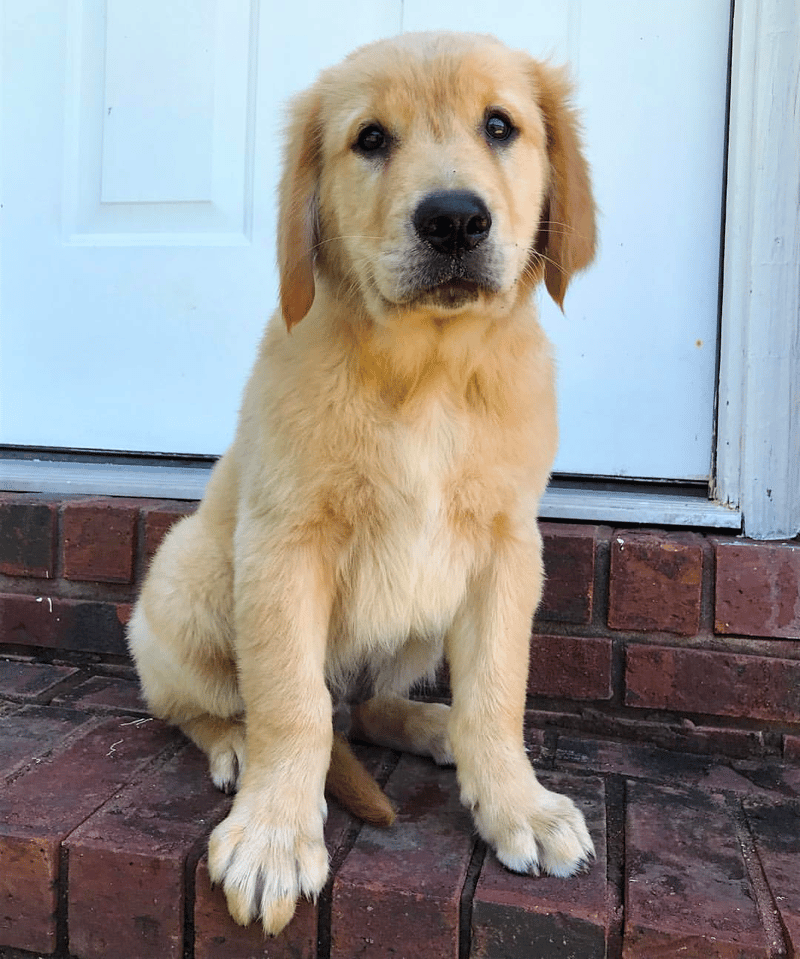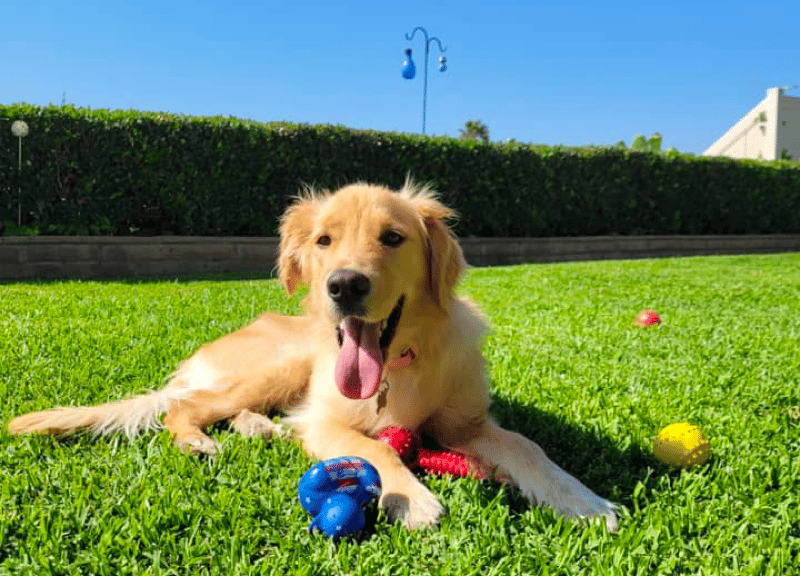Contents
- 3-Month-Old Golden Retriever Puppies: They’re Expert Adventurers!
- How Big A Three-Month-Old Golden Retriever Will Get?
- What Does a 3-month-old Golden Retriever Look Like?
- 3-Month-Old Golden Retriever Puppy: Sleeping Habits
- How Much Exercise Does A 3-Month-Old Golden Retriever Puppy Need?
- How Far A Three-month-old Golden Retriever Can Walk?
- How to Train a 3-Month-Old Golden Retriever Puppy
- How Much Food to Feed a Three-Month-Old Golden Retriever Puppy
- Biting
- Conclusion
At three months old, Golden Retriever puppies have experienced a lot of the world and their surroundings, which makes them more confident and can make them little rascals. And most notably, they’re bigger!
By now, three-month-old puppies should be acquainted with their new homes, having been there for several weeks. But just because they’re big and confident doesn’t mean they’re fully grown or developed. They’re still babies, and they’re still developing relationships with their new families and learning about their environments.
Parents of these rambunctious, quickly-developing puppies are full of concerns. They want to know if they’re training their puppy the right way if they could be doing anything better or handling situations better, and if their puppy is developing normally.

We’ll give you everything you need to know about 3-month-old Golden Retriever puppies in this article. You’ll learn about:
- Everything you should expect from a 3-month-old Golden pup
- Three-month-old Golden Retriever size: weight and height
- Sleeping habits
- How much exercise does a three-month-old Golden need?
- Training a 3-month-old Golden Retriever
- Feeding a 3-month-old Golden Retriever
- How to curb 3-month-old Golden Retriever biting
Owning and caring for a 12-week-old puppy is so rewarding, but taking care of the needs of these babies constantly can be a lot to deal with. Luckily, by reading this article and learning what to expect from your pup, you’ll be better prepared to deal with it and it’ll be a bit easier!
3-Month-Old Golden Retriever Puppies: They’re Expert Adventurers!
Golden puppies at this age have become acquainted with their home. Their experience coupled with the trust they’ve built up in their family members and their stable environment allows them to develop confidence.
Golden Retriever puppies are quick learners, and they’ve likely learned your schedule and the routines of your family. They’ve got a good handle on how and when things happen around your house, as well as their role in the household.
Because of their newfound confidence, you’ll notice your pup will start exploring and going on adventures more often.
Unfortunately, that confidence borders on cockiness, and your sweet little puppy will sometimes seem like an agent of chaos and mischief. They’ll chew up shoes, kids’ toys, pillows, toilet paper, and anything else that they find interesting.
12-week-old Goldens have more energy to spare than they did when they were 8-weeks-old, too. So they’ll be a lot more active. This means they’ll start jumping over higher obstacles, run faster and longer than they were previously able to, and start taking on more difficult tasks like climbing stairs.
Your puppy will also be more vocal during this time period and bark more often. They’re especially prone to barking when they’re frustrated or excited. This is your puppy experimenting with its voice and learning about its capabilities.
Three- months- old also marks a very important milestone for socialization. It’s most crucial to socialize Golden Retriever puppies from 3 weeks to 16 weeks of age. The socialization skills they learn during this time will stay with them for the rest of their lives.
This means it’s important for you to give them a variety of positive experiences involving sounds, sights, new environments, people, and anything else they’ll deal with as an adult dog when they’re three months old.
Golden Retrievers are naturally really friendly dogs, so one of the things you’ll need to teach them is how to simply sit back and watch people and other dogs, and when social interactions are appropriate. Otherwise, they’re likely to want to try to socialize with everyone that walks past (or near) them.
Try to avoid exposing your three-month-old Golden Retriever puppy to scary situations. Just as scary events can leave lifelong impressions on children, they can traumatize your puppy, as well. This can result in giving your dog permanent fears, phobias, and anxiety.
Three months is still quite young for any sort of baby, so you need to remember that your role is that of a parent and a nurturer. If you treat your puppy with patience and understanding, you’ll notice that they’ll develop into a well-adjusted adult.
How Big A Three-Month-Old Golden Retriever Will Get?

New puppy parents are often worried about whether their puppy is growing properly and if they’re the right size for their age, so this section should ease some of those worries.
How much should a three-month-old Golden Retriever weigh?
A three-month-old Golden Retriever puppy will typically weigh somewhere between 15-35 lbs. That’s a large range, but it’s because there’s no uniform weight for puppies at this age. Each pup is different and their health and size will be as unique as they are!
The only rule that’s pretty universal about the size of three-month-old Golden Retriever puppies is that females tend to be smaller both in weight and height than male pups.
What Does a 3-month-old Golden Retriever Look Like?

Puppies grow pretty rapidly when they’re three months old, so you’re likely to notice that their legs and nose may grow longer this month.
It’s crucial to make sure that your puppy maintains a healthy weight during this time. If they gain too much weight while they’re still growing and developing it can put too much stress on their under-developed joints, which can cause injury.
Three-month-old Golden Retriever puppies are typically around 10 – 20 inches tall.
Of course, there are several varieties of Golden Retrievers and they all have different sizes and builds. Talk to your vet about your puppy’s weight and size to find out if your puppy is developing properly and maintaining a healthy weight.
3-Month-Old Golden Retriever Puppy: Sleeping Habits
Puppies sleep a lot because they’re in a continual process of growing.
Your Golden Retriever puppy will need somewhere around 18 hours of sleep a day.
Some days your puppy will sleep more. When this happens, just let them sleep because they’re probably going through a growth spurt, or developing mentally. Whatever the case, your pup needs the extra zzzs.
Puppies aren’t good at getting themselves to sleep or noticing when they need a nap, even when they’re really tired.
If puppies get overly tired they get cranky and start getting wild and bitey. You’ll need to intervene in these instances because when this happens they’re exhausted, acting out, and can’t wind down on their own.
If you use a pen or a crate, you’ll love how easy it is to teach your puppy to go to sleep. It’s easy to outfit a crate or pen with comfortable bedding and toys to promote sleep.
It’s a great idea to put a soft toy in the pen or crate because puppies chew and mouth things as they drift off to sleep. Chewing is comforting to them. It’s a lot like babies soothing using pacifiers.
Another great way to help your pup wind down and get to sleep is by covering their crate with a blanket. This shuts out light and other stimuli so the puppy can focus on sleep without getting distracted.
The more they grow, the less you’ll have to help them get to sleep. They’ll learn to do it on their own. (Again, this is much like children. You have to help them get to sleep when they’re young, but they grow out of it eventually.)
When you see your puppy laying down and getting comfortable, you should put them in their pen or crate so they can take a nap.
A good rule of thumb is that if your puppy has been awake and playing for around an hour, it’s time for a nap soon. This should help you avoid a sleepy, bratty, bitey puppy that’s going off the rails because they need a nap.
A lot of behavioral issues and hyperactivity at this age stem from a lack of sleep, so you can save yourself a lot of trouble if you start working to ensure your pup gets enough sleep.
Sleep is vital to any three-month-old Golden Retriever puppy, so it’s important that you learn how to work with your pup’s sleep schedule.
How Much Exercise Does A 3-Month-Old Golden Retriever Puppy Need?

Like most pet owners, you likely got your puppy when it was two months old. This month, your puppy has a lot more energy!
Although they’re still very much puppies, you can tell that they’ve been developing their motor skills during this past month because they’re not as clumsy and their movements are more coordinated.
Most Golden Retriever owners assume that since puppies have this excess energy they need to exercise to burn it off. Of course, puppies do need exercise to grow and develop, but there’s a limit to that. Too much wear and tear on their bodies while they’re developing can cause lasting injuries.
Your puppy will be able to instinctively know how much exercise they need. When they want to stop, let them.
A three-month-old Golden Retriever puppy won’t have the stamina needed for things like long walks and hikes yet. However, they’ll love short, low-intensity walks.
Your puppy may plop down to rest in the middle of your walk. This is pretty normal at this age. Don’t make them get up and continue walking when they’re obviously tired. Instead, give them a few minutes to rest and see if they catch a second wind and start walking again. If they don’t, you can pick them up.
You shouldn’t think of walks at this stage as an exercise for yourself, but as more of a fun adventure for your pup. You should set your walk not in terms of distance, but in terms of minutes.
How Far A Three-month-old Golden Retriever Can Walk?
Your pup will likely be tired after 10- 20 minutes of walking.
If you’re out for 10-20 minutes and don’t make it an entire block because your pup decided to smell everything it came across and pick up every stick and rock it found, that’s fine. It’s more about the experience and having fun than it is being produced.
Another form of exercise that three-month-old puppies love is free play.
You can let your puppy have free play outside if you have a fenced-in yard.
Whether you have a fenced-in yard or not, your puppy will benefit from indoor playtime, as well. Golden puppies love a good romp with their favorite toys!
You can play fetch with your Golden. In fact, because they’re retrievers, they excel at it. But you don’t want to play for prolonged periods of time. It’s a pretty intense exercise that can hurt their little muscles and joints if they do it too much.
Get your puppy outside and let them play. Golden Retrievers love the outdoors! They were originally bred to be hunting and field dogs, and although they have a variety of purposes today, they still love the great outdoors.
Your pup will enjoy playing around outside and going for short nature walks. If you choose a longer leash, your puppy can explore independently without the dangers of being unleashed.
Remember to keep any outing with your puppy short and let them take a break if they act like they’re tired.
For more information about the exercise needs of golden retrievers, check out our article about how much exercise golden retrievers need.
How to Train a 3-Month-Old Golden Retriever Puppy
Training is an important part of raising any puppy and ensuring they grow into a well-mannered adult.
The best advice I can give you is to frequently remind yourself that your puppy isn’t human, and it’s a baby. So it won’t understand why it shouldn’t chew up your shoes or steal your food. And it definitely won’t understand you if you yell at them.
Stay patient, and remember that you’re teaching your fur baby how the world works and how you expect them to behave.
You need to train your puppy to be comfortable with being alone early on. You won’t be home all the time, and you’ll eventually need to step out to shop for groceries or attend a social event.
You can teach your puppy to be okay with being alone by using a crate or gates. If you leave a three-month-old Golden Retriever puppy alone with free reign of the house, you’ll regret it later!
You’ve likely already started potty training long before your puppy turned three-months-old, but you’ll need to continue the training at this stage.
It’s important that you use positive reinforcement to train your golden pup. Golden Retrievers are easily trained with positive reinforcement (and treats!), but negative reinforcement or punishment-based training techniques won’t yield the same results.
A three-month-old Golden Retriever can learn a lot quickly, so they’re quite easy to train.
You’re going to need a lot of treats to train your pup! Golden Retrievers are people-pleasers and they love food, so if you couple positive reinforcement with treats, they’ll do whatever you want them to!
Here are some other forms of training you can consider:
- Greeting new people they meet in your house or in public politely
- Good food manners
- Giving you items they’ve stolen in exchange for treats
- Coming to you when you call them
- Learning how to behave on a leash
- Learning to behave when being groomed or otherwise handled
Training your Golden Retriever puppy will require a lot of work, patience, and consistency. But, you don’t have to do it for hours each day. You’ll be surprised how much your pup will learn if you spend just a few minutes a day training them.
For more information about puppy training, check out our article about golden retriever puppy training.
Remember that some days your puppy will have lots of energy to train, while others they won’t. It’s going to be easier to work with them some days than others, so just be patient with them (and yourself).
How Much Food to Feed a Three-Month-Old Golden Retriever Puppy
Your puppy is getting bigger, so it’s going to eat more.
It’s important to know how much food to feed a three-month-old Golden Retriever puppy.
In general, you should feed a three-month-old Golden Retriever puppy around 2 cups of puppy food per day spread out over the course of three meals.
Again, there are no set- in- stone rules for how much to feed a three-month-old Golden Retriever. Some will eat more than others, and some will eat less.
Your pup’s appetite will vary from day to day, as well. Some days you’ll notice that they’ve not quite eaten all their food, while on others you’ll notice that they’ve emptied their bowl and seem to want more.
Golden Retrievers love food, and they’re known to gobble down their food quickly. For this reason, you can give your puppies toys with food in them to slow them down a bit and give them a bit of mental stimulation during the process.
You don’t have to spend a ton of money on toys to make mealtime fun for your puppy. You can put some puppy food on a towel or blanket, then roll it up and let your puppy find their food. You can also toss some kibble on the ground outside and let your pup follow their nose to their food. It’s easy to cut a hole in a canister, add puppy food, replace the lid and let the puppy roll it around. When it rolls, the kibble will come out of the hole.
Using toys while feeding your puppy can help with their insane energy levels, too!
If you’re wondering what sort of food to feed your puppy, check out our article about the best dog foods for golden retrievers.
Biting
Puppies will bite, chew and nip. It’s part of normal Golden Retriever puppy development.
Biting and chewing are just how puppies play. They’re really mouthy at this age, much like human infants are. The problem is that they have little needle-sharp teeth that hurt!
It’s possible that your puppy will start losing baby teeth this month which will cause them to chew and bite more to deal with the discomfort.
You need to provide your puppy with lots of toys and things they’re allowed to chew on during this time.
When your puppy bites and nips at you, it’s natural to feel frustrated and annoyed. But you need to stay calm so that you can teach them to stop.
When they bite you and you respond to it, they’ll just do it more, or bite harder. So it’s important not to get emotional or let the puppy get a rise out of you.
Instead, give them a toy to chew on.
Another thing that helps is setting up a baby gate. When they bite and play too rough, you can put them on one side of the gate and yourself on the other side. This works like a “time out” for your puppy. Just let them stay in there long enough to calm down. When you do this, stay calm. The whole idea is to let them calm down, and it’s not calming to anyone for you to be yelling and freaking out.
Some people worry that puppies biting during this stage indicates aggression, but three-month-old Golden Retriever puppies rarely exhibit aggression this early on. Your puppy is probably just chewing to relieve tooth discomfort, because they’re excited, or because they’re too tired.
If you make sure your puppy gets enough sleep, you’ll likely avoid a lot of biting.
One toy suggestion for puppies that are biting is a flirt pole toy. This is a stick with a toy attached with a string that you can pull around on the ground or floor. The puppy can burn off some energy chasing the toy, and then bite and chew on the toy once they catch it.
By using a toy on a stick, there’s some distance between you and the puppy and minimize biting. Move the toy away from the puppy, and the second they drop the toy start moving it again.
You need to make sure you’re letting the puppy catch the toy sometimes. If you don’t, they’ll just give up because you’ve made the game impossible for them to win. Let your puppy catch the toy and bite it because the more they bite the toy and play with it, the less they’re biting you.
Again, don’t play this game with your puppy for too long. Excessive play and exercise can damage their developing joints and muscles.
Conclusion
Three-month-old Golden Retriever puppies are so much fun!
They’re more confident and adventurous than younger pups, and they’re eager to interact with their humans (and other people!).
Even though they’ve grown a lot during the past month, you need to remember that they’re still a puppy and you still need to give them a lot of care and guidance.
During this month you should be doing lots of training, socialization, and bonding with your fur baby.
With the right amount of nurturing and support, your puppy will grow into a well-behaved, emotionally- mature adult in no time!
If you haven’t found a Golden Retriever puppy to bring home yet, check out our article about how to find reputable golden retriever breeders.
Check out our other posts about the development of Golden Retriever puppies:
- Raising Your Golden Retriever Puppy to Adulthood: Height and Weight Growth Chart
- 6-week-old Golden Retriever Puppies
- 8-week-old Golden Retriever Puppies
- 4-month-old Golden Retriever Puppies
- 5-month-old Golden Retriever Puppies
- 6-month-old Golden Retriever Puppies
- 7-month-old Golden Retriever Puppies
- 8-month-old Golden Retriever Puppies
- 1-year-old Golden Retriever Puppies
- 2-Year-Old Golden Retriever: Full-Grown, Adulthood, Playful
- Senior Golden Retriever: Signs of Aging and How to Care for Your Old Dog
